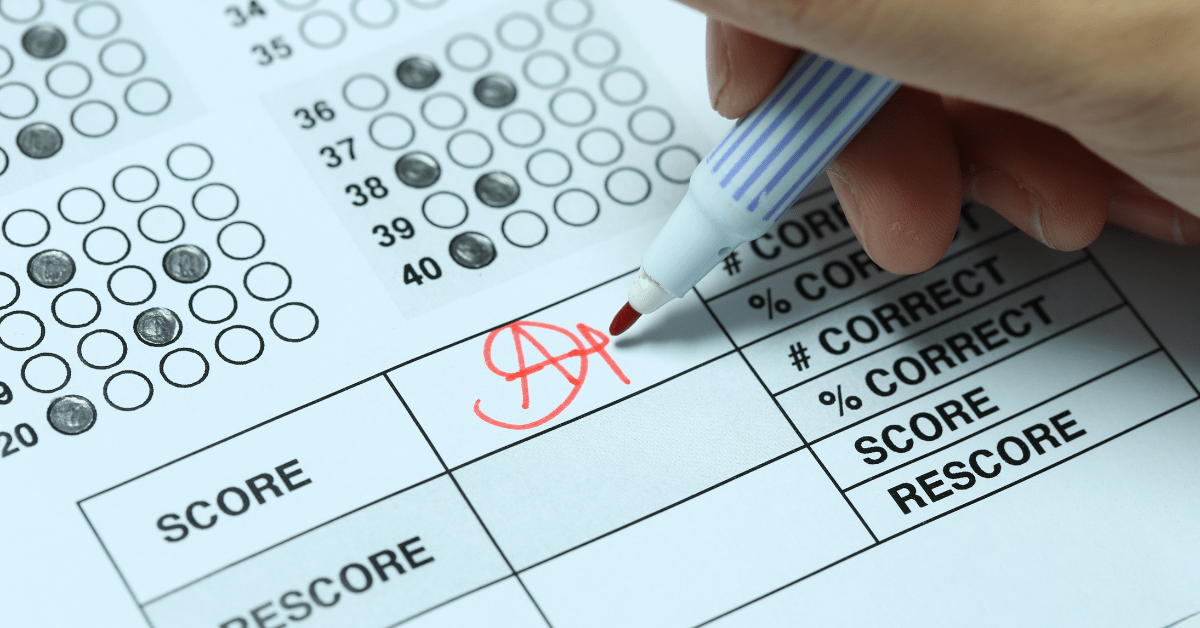
As the end of the semester approaches, many students eagerly await their final grades. For most, the grades they receive accurately reflect their performance throughout the term. However, there are occasions when students receive a grade that they don’t agree with. In these instances, questions may arise about whether a professor has the authority to change a final grade. While the answer may not be straightforward, it is crucial to understand the factors that may influence such a decision. In this article, we will explore this topic in-depth and provide you with all the information you need to know.
- Reasons Why a Professor Can Change Your Final Grade
- How to Change Your Grade?
- What Is the Maximum Time Frame for Changing Your Final Grade?
Reasons Why a Professor Can Change Your Final Grade
If you want to get an immediate answer to the question of whether professors can change your final grade, the answer is yes. But, there is always a “but.” It’s not all that simple. There are specific circumstances and processes that must be followed. Firstly, it’s important to note that a professor cannot change a final grade arbitrarily. They must have a valid reason for doing so based on their grading policies and procedures.
Changing grades once they are finalized is a very complicated process. The professor needs to submit (with proper reasoning) why the student’s mark needs to be changed; this goes to the chair for approval and then goes to the faculty (I believe this is the process). So in short, they can’t change your mark without a good reason and ‘sorry the student ditched me’ isn’t one. by winstonl by winstonl |
Some circumstances that may warrant a change in final grade include:
- Calculation errors: If a professor made an error in grading or calculating your final grade, they can correct the mistake and change your final grade accordingly.
|
At once, I received B grade in one of my courses and I was not really satisfied. So I applied for reconsideration or recount, unfortunately, the Professor sent me a negative feedback that she was not able to find any changes in the result. Then I bravely initiated to go back and see her in person. She showed me every paper and proved that nothing to be added. I humbly requested if I could do the counting again and again. She allowed a few minutes until I found only 0.5 mark. I pointed out that mark that she must have missed it. Upon adding the 0.5 point to the raw score, surprisingly, my total mark hit the next grade. That’s how my Professor changed my grade. |
- Incomplete grades: If you had an incomplete grade due to extenuating circumstances like illness or other personal issues, your professor may be able to change your grade once you’ve completed the required coursework.
- Academic dishonesty: If your professor discovers that you engaged in academic dishonesty like plagiarism or cheating, they may fail you for the course or lower your final grade.
As a department head I have dealt with a couple of cases over the years where a student’s work was not just good, but “too good.” It was found to have been plagiarized… stolen from the actual author of the work and presented as their own. The proper thing to do in such a situation is to rescind the grade and replace it with failure in the course. In some cases a student may even be suspended or expelled. The kinder approach that I personally have usually preferred is that the student must repeat the course, having failed it, and if that means spending another semester when they otherwise would have graduated, so be it. One student I recall who was put through that had really learned his lesson. He was VERY carefully scrutinized as he retook the course, but had a great attitude, worked hard, and did his work himself, and thereupon graduated (with pride rather than shame). by David Miller by David Miller |
- Appeals process: If you believe that your final grade was unfairly or incorrectly assigned, you may appeal to your professor or academic institution for a grade change.
Here what’s teachers themselves highlight among common reasons for changing grades:
|
The most common reasons are:Changing a grade from Incomplete to a letter gradeChanging a grade from an F that was registered automatically when a student failed to make up an Incomplete.A mistake in calculation of the grade.A mistake in recording of the grade.What does not ever work is for a student to come and say: I know I got a B but I really need an A to get into medical school, so can you please change my grade from a B to an A. Don’t even think about asking something like that. It only embarrasses you. |
| 1. When I discovered the student plagiarized. 2. When it became clear that the reason a paper was late was legitimate. 3. When I made a calculation error. 4. When the administration told me I had to. 5. When I discovered that I marked things wrong that were not wrong. 6. When I had lost a paper and subsequently found it.  by Michael Wynne Sellars by Michael Wynne Sellars |
How to Change Your Grade?
After your professor enters your final grade, it becomes a permanent part of your transcript. BTW, make sure you understand what is a good GPA for you. However, if you believe that your grade is unfair, you can still challenge it. Before submitting a grade appeal, it is important to ensure that you have a strong argument to support your request for a grade change.
1. Review the Policy on Changing Grades at Your College
Disputing your final grade may not always be the most straightforward solution. There is a specific process that must be followed within a certain timeframe, which may vary among various universities. So it’s better to carefully study the regulations on that issue at your institution in advance. For instance, it is possible for the request to be denied by the college solely because the student did not adhere to the proper process or submitted it too late. Some schools require students to file an appeal within 10-30 days of receiving their grades.
As practice shows, teachers work closely with their students and look for ways to help them succeed and achieve their academic goals:
 If I need to correct a grade after the semester ends, I only have to fill out a simple web form: semester, course, student (picked from the final roster), new grade. Before it was electronic, it was a simple paper form. Formally, the form is only a request, but in 20 years, I’ve never seen a grade change request denied, sent back for more information, or take more that a week to take effect… (To be fair, I’ve never tried to change a grade downward.)
If I need to correct a grade after the semester ends, I only have to fill out a simple web form: semester, course, student (picked from the final roster), new grade. Before it was electronic, it was a simple paper form. Formally, the form is only a request, but in 20 years, I’ve never seen a grade change request denied, sent back for more information, or take more that a week to take effect… (To be fair, I’ve never tried to change a grade downward.)
– by JeffE
To determine whether the grade should be changed, colleges may ask for specific evidence, such as graded assignments and the grading policy. In circumstances where professors use unfair standards, fail to provide a grading policy, or base the grade on something other than academic performance, students can usually resolve the issue by contacting the department chair or a dean. Nonetheless, if a student feels the grade was biased and cannot present specific evidence, appealing the grade will likely be unsuccessful.
2. Reach Out to Your Professor
To address concerns about your final grade, it is often more effective to do so before the term ends. Asking your professor about extra credit opportunities like an additional paper or redoing the assignment can result in a better outcome than disputing grades after the term. What’s more, if grading policies are not included in the syllabus, you can speak to your professor about adding them. Of course, it all depends on a teacher’s type and whether he/she can make concessions and change your grade.
 If your professor is anything like me, you cannot.
If your professor is anything like me, you cannot.
– by Shefaly Yogendra
Professors are not infallible beings. They are prone to making mistakes as any other human being.
 Professors are human and make errors, but don’t expect them to be especially gracious to you…It’s not fair to other students.
Professors are human and make errors, but don’t expect them to be especially gracious to you…It’s not fair to other students.
– by Michael Wynne Sellars
If you find yourself receiving a failing grade, do not assume it to be a deliberate attempt by the professor to fail you. It could just be an ordinary mistake. For example, like in this case:
 (One semester, I had a systematic error in my final grade calculations—an off-by-row error in the spreadsheet—affecting about a third of the class, which I only discovered after the deadline. That was a fun afternoon.) I have never had a grade request turned down. I have never had a grade request take more than a few days to be approved, or more than a couple of weeks to take effect, even when the forms were on paper.
(One semester, I had a systematic error in my final grade calculations—an off-by-row error in the spreadsheet—affecting about a third of the class, which I only discovered after the deadline. That was a fun afternoon.) I have never had a grade request turned down. I have never had a grade request take more than a few days to be approved, or more than a couple of weeks to take effect, even when the forms were on paper.
– by Jeff Erickson
And it also costs a lot of time and effort for them to correct their mistakes:
 Last fall I managed to give a bunch of my students an ‘M’ (Missing) by navigating off the grade-entry page before clicking Save. Needless to say, I got a lot of email when grades were released. It was a pain to fix, as I had to navigate to each student in the class individually and modify the grade.
Last fall I managed to give a bunch of my students an ‘M’ (Missing) by navigating off the grade-entry page before clicking Save. Needless to say, I got a lot of email when grades were released. It was a pain to fix, as I had to navigate to each student in the class individually and modify the grade.
– by David Maier
So what can you do? You have the option to arrange a meeting with your professor to clarify any misunderstandings about your unsatisfactory grade. You can politely request the professor to elaborate on their feedback, which will allow you to comprehend the reasons behind your grade.
 …The procedure would be something like the following:The student contacts the professor, says “I believe there was a mistake in my grading, for the following reason: [Reason goes here.] Would you be willing to double check this?”If the professor agrees that he/she made a mistake, then the professor follows an official process and requests of the administration that the grade be changed. Generally, I would expect this request to go through.In particular, I would recommend (politely) contacting the professor as soon as possible, but whenever the mistake is noticed.
…The procedure would be something like the following:The student contacts the professor, says “I believe there was a mistake in my grading, for the following reason: [Reason goes here.] Would you be willing to double check this?”If the professor agrees that he/she made a mistake, then the professor follows an official process and requests of the administration that the grade be changed. Generally, I would expect this request to go through.In particular, I would recommend (politely) contacting the professor as soon as possible, but whenever the mistake is noticed.
– by academic
By taking these steps, you will demonstrate your concern and interest in your academic performance.
However, if you suspect that the professor is deliberately trying to change your grade unfairly, you have the right to take action. Do not stay silent and endure unwarranted mistreatment and injustice from the professor.
So if the teacher, for some reason, doesn’t approve of the grade change, you should proceed to the following stage.
3. Get in Touch With the Department Chair
If you are unable to resolve issues directly with your professor, you may need to contact the department chair.
It is recommended that students schedule a meeting with the department chair before initiating any paperwork to challenge their grades. Department chairs act as intermediaries in resolving disputes between students and professors. It is important to present supporting evidence for the request, such as graded assignments and syllabus grading policies. If the department chair concurs, they will usually contact the professor and commence the process of changing the grade. However, even if the chair disagrees, students can still pursue the appeal procedure.
4. Submit Grade Dispute Paperwork
If students are unable to resolve a grade dispute with their professor and department chair, they have the option of filing grade appeal paperwork with their college. In certain colleges, students may need to contact an academic dean or a student affairs administrator during this step. It is crucial for students to present a compelling argument for a grade change. Throughout the grade dispute process, students should explain whether the final grade was the result of an error or discrimination. Additionally, if grading policies were not clearly defined or if there is evidence of arbitrary grading, an appeal may be warranted.
A committee or dean will review the appeal and make a decision. Some schools may allow students to appeal this decision to the provost’s office.
What Is the Maximum Time Frame for Changing Your Final Grade?
Typically, final grades must be submitted by a specific deadline established by the school.
 by Daveguy by Daveguy |
Professors are given a due date for submitting all final grades, and once those grades have been submitted, they cannot be modified except under certain circumstances that we’ve covered earlier.
It’s essential to remember that changing your final grade, even after the grading period or semester, is possible but can be a complex and time-consuming process.
 by user111388 by user111388 |
According to state law, teachers’ grades must be final and are only eligible for modification if they are arbitrary, inaccurate, or violate the district’s grading policy. But again, in most cases, everything depends mainly on the teacher.
 by Eric Bittner by Eric Bittner |
So if you have doubts about the possibility of improving your final grade after the semester has ended, just read this inspiring story of Eric Wieschaus that we titled ‘From B’s to Nobel Prize.’ It will serve you as a reminder that grades do not necessarily define a person’s potential for success, so we encourage you to never give up on your dreams and to always strive for excellence, regardless of what your grades may say. Check this out and rest assured that it’s never too late to attain better grades, even 30 years after graduation:
Wieschaus had received B’s during both semesters of his freshman chemistry class. However, after he graduated in 1969, he later earned the Nobel Prize in Medicine for his work involving the formation of body parts in relation to genes in 1995. Later that year, Wieschaus returned to Notre Dame to deliver a lecture in honor of his former teacher, Emil Hofman, who had given him the B’s. When Hofman heard that Wieschaus would be lecturing, he decided to look up his grades. Upon seeing that Wieschaus had received B’s, he marched to the registrar’s office to change his grade on the grounds that he had accepted the award of the Nobel Prize as extra credit. During the introduction of Wieschaus’s lecture, Hofman presented Wieschaus with his newly changed grades. Upon return to Princeton, Wieschaus proudly showed his new A to his class that he was teaching, pronouncing, “This is what it takes to get an A at the University of Notre Dame”.  by Laurel Ayuyao by Laurel Ayuyao |
Final Thoughts
In conclusion, the issue of changing final grades can be a complex one, with various factors that may influence a professor’s decision. While it is essential for students to understand their rights and options in such situations, it is also crucial to approach any discussions with their professors in a respectful and professional manner. Ultimately, open communication and a willingness to understand each other’s perspectives can lead to a fair and satisfactory resolution for all parties involved. With this knowledge, students can approach the end of the semester with confidence and clarity regarding their final grades. For further reading, we recommend the article on motivation to study and about student homework help services.

 by
by  by
by 


